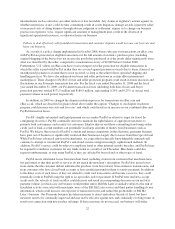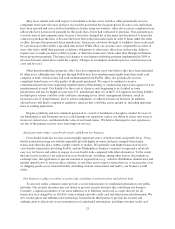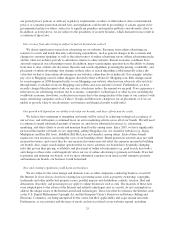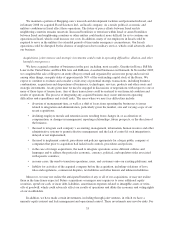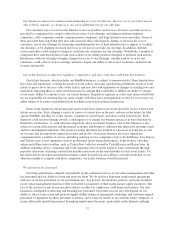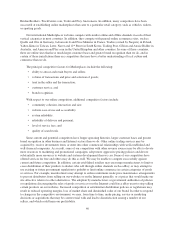eBay 2009 Annual Report Download - page 40
Download and view the complete annual report
Please find page 40 of the 2009 eBay annual report below. You can navigate through the pages in the report by either clicking on the pages listed below, or by using the keyword search tool below to find specific information within the annual report.• challenges associated with joint venture relationships and minority investments, including dependence
on our joint venture partners;
• difficulties in implementing and maintaining adequate internal controls;
• longer payment cycles, different accounting practices, and greater problems in collecting accounts
receivable;
• potentially adverse tax consequences, including local taxation of our fees or of transactions on our
websites;
• higher Internet service provider costs;
• different and more stringent user protection, data protection, privacy and other laws;
• seasonal reductions in business activity;
• expenses associated with localizing our products, including offering customers the ability to transact
business in the local currency;
• restrictions on the repatriation of funds, foreign currency exchange restrictions, and exchange rate
fluctuations;
• volatility in a specific country’s or region’s political, economic or military conditions (e.g., in South
Korea relating to its disputes with North Korea);
• challenges associated with maintaining relationships with local law enforcement and related agencies;
and
• differing intellectual property laws.
Some of these factors may cause our international costs of doing business to exceed our comparable
domestic costs. As we expand our international operations and have additional portions of our international
revenues denominated in foreign currencies, we also could become subject to increased difficulties in collecting
accounts receivable, repatriating money without adverse tax consequences, and risks relating to foreign currency
exchange rate fluctuations. The impact of currency exchange rate fluctuations is discussed in more detail under
the caption “We are exposed to fluctuations in currency exchange rates and interest rates,” above.
In addition, we conduct certain functions, including product development, customer support and other
operations, in regions outside the U.S., particularly in India and China. We are subject to both U.S. and local
laws and regulations applicable to our offshore activities, and any factors which reduce the anticipated benefits,
including cost efficiencies and productivity improvements, associated with providing these functions outside of
the U.S. could adversely affect our business.
We are continuing to expand PayPal’s services internationally. In some countries, expansion of PayPal’s
business may require a close commercial relationship with one or more local banks, a shared ownership interest
with a local entity or registration as a bank under local law. Such requirements may reduce our revenue, increase
our costs or limit the scope of our activities in particular countries. Any limitation on our ability to expand
PayPal internationally could harm our business. The Reserve Bank of India has asserted that PayPal’s offering of
payment services to customers outside of India to send personal, non-commercial payments to recipients in India
requires a license from the Reserve Bank. The Reserve Bank has directed the Indian affiliate of PayPal’s
processing bank to suspend all withdrawals to the Indian bank accounts of PayPal customers for both personal
and business customers. PayPal has suspended personal non-commercial payments to Indian accounts, and
intends to apply for a license from the Reserve Bank of India, but PayPal could be subject to fines from the
Reserve Bank for the period of operation without a license, and PayPal’s prospects for future business in India,
both cross-border and domestic, could be materially and adversely affected.
32


